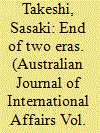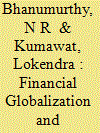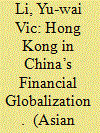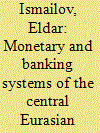| Srl | Item |
| 1 |
ID:
112487


|
|
|
|
|
| Publication |
2012.
|
| Summary/Abstract |
The scope of the present global financial crisis is comparable to that of the 1930s. Public policies responding to each have been very different, however. The large macroeconomic response of the past three years has averted a new Great Depression, but regulation of the financial sector has been much softer than in the 1930s. This is partly due to financial globalization that extends beyond the capacities of national regulators. Macroeconomic antidepression measures have created new realities: the rise of indebted states. The sovereign crisis imposes market discipline on states while, conversely, states are too weak to impose regulatory discipline on markets. New modes of supranational regulation and a new ethics of the public interest are necessary for a new era of balanced prosperity.
|
|
|
|
|
|
|
|
|
|
|
|
|
|
|
|
| 2 |
ID:
113542


|
|
|
|
|
| Publication |
2012.
|
| Summary/Abstract |
The effects of inequality and financial globalization on democratization are central issues in political science. The relationships among economic inequality, capital mobility, and democracy differ in the late twentieth century for financially integrated autocracies vs. closed autocracies. Financial integration enables native elites to create diversified international asset portfolios. Asset diversification decreases both elite stakes in and collective action capacity for opposing democracy. Financial integration also changes the character of capital assets-including land-by altering the uses of capital assets and the nationality of owners. It follows that financially integrated autocracies, especially those with high levels of inequality, are more likely to democratize than unequal financially closed autocracies. We test our argument for a panel of countries in the post-World War II period. We find a quadratic hump relationship between inequality and democracy for financially closed autocracies, but an upward sloping relationship between inequality and democratization for financially integrated autocracies.
|
|
|
|
|
|
|
|
|
|
|
|
|
|
|
|
| 3 |
ID:
098181


|
|
|
| 4 |
ID:
172213


|
|
|
|
|
| Summary/Abstract |
The article examines relationship between financial globalization and economic growth in South Asian countries namely Bhutan, Bangladesh, India, Maldives, Nepal, Pakistan and Sri Lanka. Following the framework of Bekaert et al. (2005) and with the help of Panel VAR and Panel causality (in GMM framework) models the study concludes that the causation from financial globalization to growth in the region appears to be weak. There appears reverse causation running from growth to financial globalization. We found that domestic macroeconomic policies such as fiscal prudence act as pull factors for foreign capital. The article has some interesting results at individual country level.
|
|
|
|
|
|
|
|
|
|
|
|
|
|
|
|
| 5 |
ID:
104867


|
|
|
| 6 |
ID:
160426


|
|
|
|
|
| Summary/Abstract |
This article casts new light on the role played by post-handover Hong Kong in China’s financial globalization. The power of the city’s markets aside, Hong Kong possesses critical political leverage that has facilitated Beijing’s liberalizing of its domestic capital market and its projection of international financial power.
|
|
|
|
|
|
|
|
|
|
|
|
|
|
|
|
| 7 |
ID:
180756


|
|
|
|
|
| Summary/Abstract |
IN THE context of financial globalization, international financial markets have had a strong impact on the traditional structure of corporate governance in Europe. This has manifested itself in, among other things, the strengthening of European companies' work with private investors, the recalibrating of income policy to reap short-term profits in capital markets, and the aligning of accounting practices with Anglo-American financial reporting standards [Höpner, 2003:67]. Of course, the scale and depth of this transformation has differed between northern and southern European countries on account of the distinctive features of the local business culture and differences between the socioeconomic development models practiced in these countries.
|
|
|
|
|
|
|
|
|
|
|
|
|
|
|
|
| 8 |
ID:
094352


|
|
|